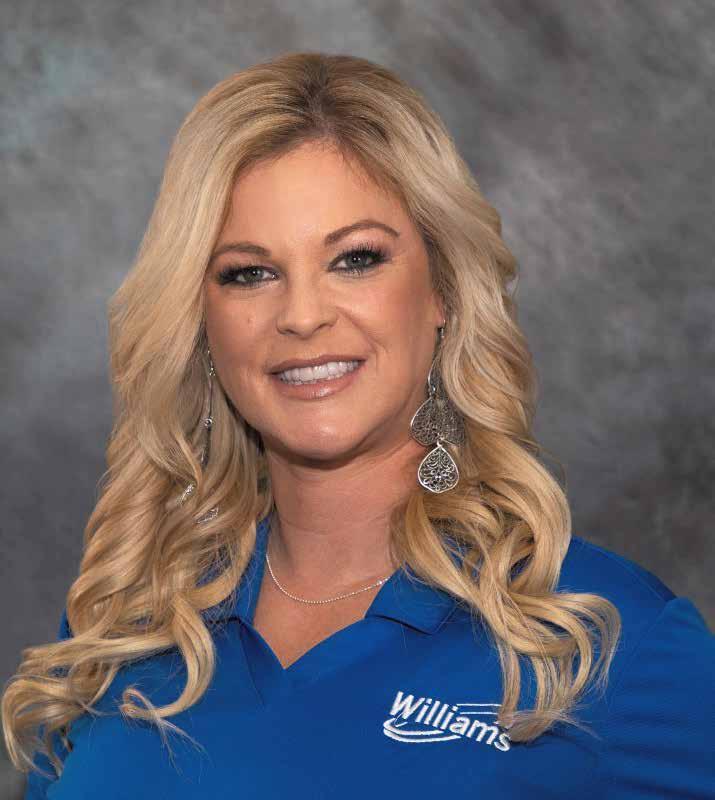
5 minute read
Tara Meek
Tara Meek
Regulatory Affairs (Women's Energy Network - WEN) & Supervisor of Permitting (Williams)
Advertisement
Your Network is Your Networth
Connecting women in the energy sector
Networking in the business world has become crucial for everyone's professional development. Particularly in the energy industry, it has proved necessary to acquire networking skills from an early stage in your career to provide your work and talent wider exposure.
Video Video Interview Interview
Interview by Ana Tafoya Editorial Coordinator (Energy Capital Magazine)
Why? The answer is simple: it's been the "traditional" way to run business.
Whether it is a professional platform to find job opportunities, or an industry network mainly focused on sharing similar experiences, people have always looked for spaces to connect with others and jointly create bigger things.
Besides, it's making connections that can really help women succeed in the industry; however, especially for them, that's not an easy thing to
WHAT IS THE IMPORTANCE OF OPENING MORE SPACES FOR WOMEN IN ENERGY TO CONNECT? WHAT ARE THE BENEFITS OF NETWORKING, AND PARTICULARLY, OF NETWORKING AS A WOMAN IN THIS SECTOR?

do. We shouldn't dismiss the fact that men have been mainly responsible for mastering and running networking circles and groups in the energy sector.
On the other hand, women have historically had less access to information and environments that can help them further their careers and/ or businesses. Having this in mind, it is no surprise that frequently, women do not feel very welcomed when joining male-dominated business networks. As a result, they have acquired/developed different networking skills compared to their male counterparts.
What is the importance of acknowledging this and thus opening more spaces for women in energy to connect? What are the benefits of networking, and particularly, of networking as a woman in this sector?
In interview with Energy Capital, Tara Meek, responsible of Regulatory Affairs with the Global Women's Energy Network (WEN), and Supervisor of Permitting with Williams, talked with us about how this association is raising the conversation among energy companies, organizations, and members, to further increase women's participation and networking in the energy sector.
One big question comes when we talk about women in energy, and that is, do female professionals have enough and fair participation in the industry? In fact, the number of women working in the sector and the positions they occupy is still a matter of concern – because there is still a long way to go




to achieve parity. However, as Tara notes, there is also room for hope.
After Covid, the number of women in the industry has significantly declined, even going back to where the industry was fifty years ago. Under these circumstances, organizations such as WEN have become crucial to help their members acquire career and leadership development.
As Tara notes, WEN is currently a global organization with presence in the United States (with 21 chapters) and Mexico, as well as with potential chapters to be open soon in Canada, Singapore, and Nigeria.
In this way, the organization supports its members on a professional basis, but not only that! WEN similarly hosts financial and physical wellness events in comfortable environments to holistically empower women.
Lastly, but equally important, WEN has a charity event supported by the WEN foundation, which
mainly focuses on providing funds for charity and scholarships for women in the industry.
The reasons for joining a network vary. However, being a female professional in a considerably masculinized sector definitely supposes having some specific needs when joining these forums. For Tara, for instance, one key reason she decided to join WEN was the lack of female representation at energy events and in the industry overall.
She remembers going to a 600 people energy event in 2008, where she was one of the only three women present. Then, she noticed how important it was to be able to join a comfortable space for networking, which had female representation, and therefore, allowed her to get empowered that way.


As she accurately points out, joining business spaces/events and being able to connect with other professionals successfully brings your career tons of opportunities if leveraged - "your network is your networth!" Tara says.
Also, you can acquire and even improve your leadership skills while feeling in a riskfree environment; since connecting in unsafe/ uncomfortable circles often foregoes many women the opportunity to expand their networks. To that, we should add that women are constantly reprehended for being perceived as 'too aggressive' when asking for what they need in business.
As a result, that can keep many talented females back when it comes to networking; and that's why it is so stringent to open more spaces for their participation. In this way, women's networks can bring multiple advantages, and their particularities are what make them so unique and powerful. As some specialized authors note, the networks formed by women, whether they consist on business matters or private-sphere issues, are less about selling and more about sharing. Accordingly, the benefits of women's networking styles are enormous; for instance, including finding valuable longterm business contacts; more disposition to hearing advice from peers and experts; and sharing knowledge and firsthand experiences, among others. Notably, a big plus is that all these benefits come with an emphasis on making longlasting connections and genuine collaboration.
Nevertheless, building and managing women's networks for empowerment is not an individual nor an easy task. The participation of all the involved parties, including companies and other industry organizations, is crucial. More comprehensive platforms mean wider exposure, and also, the larger the membership, the larger the opportunities.
In this way, WEN is hoping and already actively working to create something that can help companies address diversity and gender equality, not only by joining a network but by materially advancing their policies and actions.











